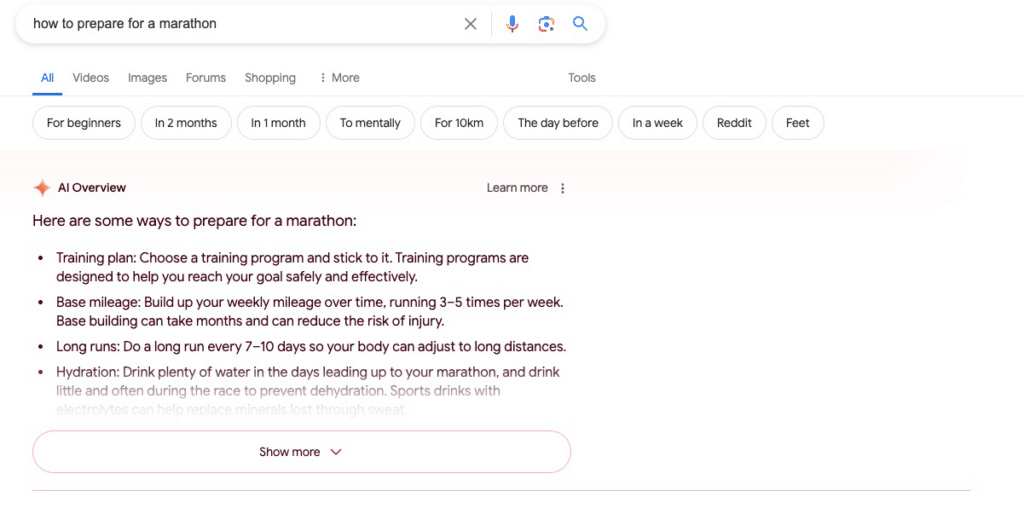For over a year, we’ve heard about the mass adoption of AI tools like ChatGPT and Gemini and we’ve already seen some major impacts on organic search traffic around the web as users substitute a traditional search for an AI assistant. Google announced a big change at Google IO ‘24 on May 14 that will continue changing how users find information, products, and services.
Starting in Late May 2024, many search results in Google will include an AI overview, summarizing answers and information for users without the need to click into individual websites. Similar features have already been in beta, often referred to as “Search Generative Experience,” or SGE.

What do AI-powered search results mean for businesses?
Historically, the goal for most organizations has been a listing as one of the first coveted blue links at the top of Google’s search results page. As you can imagine, implementing AI-based search results poses new business challenges. The result is a decrease in organic traffic as many search activities now take place completely out of a company’s website because users are opting for higher-level summaries from AI tools.
This behavior is a continuation of the “zero-click” trend that started when Google implemented rich result features to the search results pages. These rich results aimed to answer the user’s query from the search results page, without requiring a click to a website.
Should You Block or Opt-out of Being Crawled by LLMs?
You may have heard the critiques that the large language models (LLMs) that power AI search steal content and repurpose it with minimal or no attribution. This is especially frustrating for those who, for years, have been following Google’s guidance that if they just create “quality content” then their websites will perform well in search results.
Now that we’ve done that, they are using our quality content and we aren’t even receiving a click back to our sites. This is frustrating.
One natural response here is to prevent your content from being crawled by LLMs. And indeed, legitimate LLMs from companies like Google or OpenAI will honor your requests to opt-out.
However, you may be doing so at your own peril. Usage of AI will only continue to grow and blocking bots used to train LLMs may only further reduce your organic traffic and brand visibility.
How Do You Optimize Your Website for AI search?
As this landscape is changing regularly, the advice on how to optimize your site for AI-powered search may change and there is no clear path forward yet. However, we can recommend some tried and true methods for optimizing a website that are particularly beneficial for optimizing for AI:
Configure Structured Data
By definition, structured data is standardized, machine-readable code that provides crucial details about your website to AI-powered search engines and LLMs. Marking up your site with structured data can provide clear guidance to LLM and traditional bots as to the nature and structure of your content.
Use a Question-and-answer Format
For blog and thought leadership content, consider using a question-and-answer format in your articles. This strategy, along with FAQ structured data, may help LLMs understand how your content relates to user queries.
Stay Focused on SEO Fundamentals
The majority of AI-powered results are still drawn from the top search results. This suggests that the best strategy is to stay the course and continue to focus on fundamentals. For now, at least.
Focus on Technical SEO
Make your site easy to crawl by bots. In addition to schema markup mentioned above, make sure you follow technical SEO best practices and guidelines.
Evidence suggests that these foundations of strong technical SEO are still important, so continue to focus on best practices that provide crawlers and humans with good UX.
Stay the Course, But Prepare to Pivot
We’re in the “throw it at the wall and see what sticks” phase of AI. Google’s AI Overview may look different in six months or a year, and new products may be introduced that claw away even more from traditional search engines. The best thing for website developers to do at this point is to learn as much as possible about how AI is used in search and stay the course while keeping an eye on the future.
Contact Workhorse
Workhorse is a website strategy, design, and development agency providing services that help organizations follow best practices for search and create exceptional web experiences for bots and humans. We work closely with clients and their target audience to understand your unique needs and website objectives.
Contact our team of web experts and take the first steps toward unlocking the full potential of your website today!

